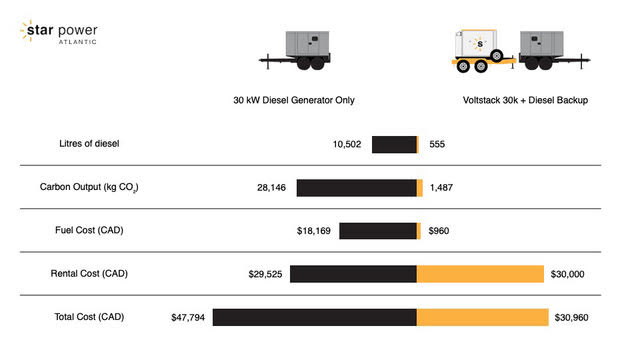When Sullivan's Crossing returned for its third season, the production team set out to reduce its environmental footprint while maintaining reliable on-set power. Filming in an underpowered studio in Nova Scotia presented a unique challenge—limited electrical capacity meant the crew couldn't put additional load on the existing infrastructure. To address this, the team integrated the Voltstack 30k, a mobile battery energy storage system (BESS) designed for high-demand applications.
The Challenge: Powering a Remote Production Sustainably and Silently
Sullivan’s Crossing Season 3 required a dependable power source for their studio, particularly at night when set carpenters needed to work. The studio building wasn't wired for higher power, with house power already maxed out. Upgrading the site through Nova Scotia Power would have taken 6-9 months—an unacceptable timeline for production. During the day, the team used generator trucks, but they needed a quieter, cleaner solution for overnight operations.
“Due to the remote location of our studio, on-site power infrastructure was limited, leaving continuous generator use as the default solution. However, with the Voltstack 30K available to us in the region, we were able to transition toa hybrid energy model. The system provided clean,silent power during overnights and weekends, significantly reducing our reliance on diesel generators. Charging occurred during active production hours when generators were already in operation, ensuring zero additional fuel consumption or economic burden. This integration not only reduced our carbon footprint but also demonstrated the viability of renewable battery solutionsfor off-grid film production.” - Alex Jordan
The Solution: Voltstack 30k supplied by Star Power Atlantic
After reaching out to Pascal Gellrich at Star Power Atlantic, the production team deployed the Voltstack 30k, a mobile battery energy storage system capable of delivering 27 kW of continuous power. With 80 kWh of energy storage, it effectively powered the studio overnight. During the day, the battery would be recharged using the production's generator trucks, creating an efficient hybrid system. Compared to a diesel generator, the Voltstack offered several advantages:
● Zero direct emissions– reducing the carbon footprint of the production.
● Silent operation – eliminating disruptive generator noise during night work.
● No fuel dependency – cutting logistical costs and eliminating overnight refueling.
● Ease of use – requiring minimal oversight or technical expertise.
“Thanks to the Voltstack system and the excellent support from Star Power Atlantic, we were able to keep power running in the studio whenever we were on the road." Dave Adams, Best Rigging Electric.
The Results: Cost and Carbon Savings
Switching from a conventional diesel generator to the Voltstack 30k for overnight power resulted in significant reductions in fuel consumption, emissions, and overall costs. The intermittent loads at night were particularly well-suited to battery power, as a traditional diesel generator would need to run at higher load efficiency than required to avoid wetstacking, wasting fuel.
Here's how a traditional 30kW diesel generator setup compares with the Voltstack 30k:

By significantly reducing diesel consumption, the battery generator with diesel backup lowered carbon emissions by over 26,000 kg CO₂—equivalent to taking multiple cars off the road for an entire year. The reduced fuel needed for the hybrid approach also translated to real cost savings, making it a budget-friendly solution.
Industry perspective: The future of clean, mobile power
The film industry has long relied on overpowered setups, often running generators at only a fraction of their capacity. This inefficiency results in excessive fuel use, high emissions, and unnecessary costs. Diesel generators, which remain the industry standard, account for around 15% of total carbon emissions in film production.Not only do they contribute significantly to the carbon footprint, but they also introduce noise and logistical challenges, such as the need for constant refueling.
"Film sets have been overpowered for years, wasting significant energy. The Voltstack 30k shows that productions can operate efficiently without excess fuel consumption, especially with intermittent loads where diesel generators would be particularly inefficient. Clean, portable power isn't just a trend—it's the future of film and TV production." Pascal Gellrich, Co-Founder of Star Power Atlantic.
Sullivan's Crossing Season 3 demonstrated that transitioning to clean energy is not only feasible but beneficial. The integration of the Voltstack 30k for overnight studio power resulted in lower emissions, quieter operations, and reduced costs—without compromising reliability. When on the road during the day, if generator trucks weren't available, the Voltstack 30k could also power the studio, providing flexibility to the production team.
This Case Study was provided by Muse Entertainment and written by Demi Valentine, Assistant to Alex Jordan and Digital Orca Marketing
If you're shooting in Atlantic Canada, and have questions about the Voltstack 30k, contact Pascal Gellrich at Star Power Atlantic.



















